 |
|---|
| Foreign relations |
This article lists the presidents of the Chamber of Citizens of the Federal Assembly of Yugoslavia.
 |
|---|
| Foreign relations |
This article lists the presidents of the Chamber of Citizens of the Federal Assembly of Yugoslavia.
| Name (Birth–Death) | Term of office | Party | ||
|---|---|---|---|---|
| Jugoslav Kostić (born 1939) | 11 June 1992 | 3 February 1993 | Socialist Party of Serbia | |
| Radoman Božović (born 1953) | 3 February 1993 | 10 December 1996 | Socialist Party of Serbia | |
| Milomir Minić (born 1950) | 10 December 1996 | 7 October 2000 | Socialist Party of Serbia | |
| Milorad Marković (1926–2013) [a] | 24 October 2000 | 3 November 2000 | Socialist People's Party | |
| Dragoljub Mićunović (born 1930) | 3 November 2000 | 3 March 2003 | Democratic Centre | |
a Acting President of the Chamber of Citizens

Ivica Dačić is a Serbian politician serving as the president of the National Assembly of Serbia since 2020 and as the leader of the Socialist Party of Serbia since 2003.
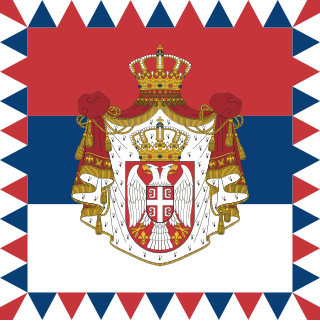
The president of Serbia, officially styled as the President of the Republic is the head of state of Serbia.
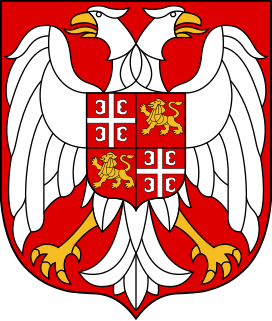
The Parliament of Serbia and Montenegro was the legislative body of Serbia and Montenegro. The parliament was unicameral and was made up of 126 deputies, of which 91 were from Serbia and 35 were from Montenegro. The parliament was established in 1992 as the Federal Assembly of Yugoslavia as a direct replacement for Parliament of Yugoslavia and was renamed in 2003. With the declaration of independence of Montenegro on June 3, 2006, the parliament ceased to exist.

The Federal Republic of Yugoslavia was a union of Serbia and Montenegro which had existed between 1992 and 2003. It was reconstituted as the State Union of Serbia and Montenegro in 2003. In 2006, the state broke up into the two independent states of Serbia and Montenegro.

Dragoljub Mićunović is a Serbian politician and philosopher. As one of the founders of the Democratic Party, he served as its leader from 1990 to 1994, as the president of the parliament of Serbia and Montenegro from 2000 to 2004.
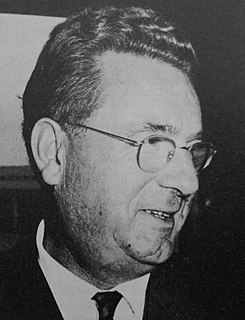
Filip Bajković was the President of the Executive Council of Montenegro from 16 December 1951 to 12 July 1962. From 12 July 1962 to 5 May 1963, he was the President of the People's Assembly of Montenegro.
Radoman Božović is a Serbian politician and former Prime Minister of Serbia.

The Parliament of Yugoslavia was the legislature of Yugoslavia. Before World War II in the Kingdom of Yugoslavia it was known as the National Assembly, while in the Socialist Federal Republic of Yugoslavia the name was changed to Federal Assembly. It functioned from 1920 to 1992 and resided in the building which now convenes the National Assembly of Serbia.
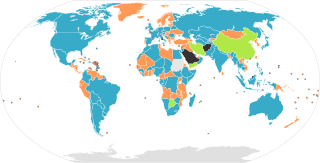
In contrast to unicameralism, and bicameralism, multicameralism is the condition in which a legislature is divided into more than two deliberative assemblies, which are commonly called "chambers" or "houses". This usually includes tricameralism with three chambers, but can also describe a system with any amount more. The word "multicameral" can also relate in other ways to its literal meaning of "many chambered" with use in science or biology.
The 1953 Yugoslav Constitutional Law was a big packet of constitutional amendments to the 1946 Yugoslav Constitution, with the goal of introducing the idea of self-management in the constitutional matter of the Federal People's Republic of Yugoslavia. It came into effect on January 13, 1953. The amended 1946 constitution would remain in power until the adoption of the 1963 Yugoslav Constitution.
The 1963 Yugoslav Constitution was the third constitution of the Socialist Federal Republic of Yugoslavia. It came into effect on April 7, 1963. The constitution was the result of beliefs of the governing structures that Yugoslav self-management relations have been sufficiently overcome in the society that it deserved a new and final constitutional definition and enthroning.

The 1974 Yugoslav Constitution was the fourth and final constitution of the Socialist Federal Republic of Yugoslavia. It came into effect on 21 February 1974.

The Federal Executive Council was the executive body of the Socialist Federal Republic of Yugoslavia (SFRY) responsible for state affairs and for supervising the implementation of laws. It consisted of up to 15 members elected by the Federal Assembly for a four-year term and the presidents of executive councils of republics and provinces. The Federal Executive Council played an important role in the Government of the SFRY from its creation in 1953 until the breakup of Yugoslavia in 1992.

Parliamentary elections were held in Yugoslavia between 16 March and 10 May 1974 through a complicated delegate system which selected delegates to local, republic, and federal assemblies.

The Chairman of the Federation Council of the Federal Assembly of the Russian Federation, also called Speaker (спикер), is the presiding officer of the Upper house of the Russian parliament. It is the third highest position, after the President and the Prime Minister, in the government of Russia. In the case of incapacity of the President and Prime Minister, the chairman of the Federation Council becomes Acting President of Russia.

Parliamentary elections were held in Yugoslavia between 10 March and 10 May 1978 through a complicated delegate system which selected delegates to local, republic, and federal assemblies.
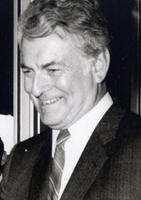
Parliamentary elections were held in Yugoslavia between 10 March and 10 May 1986 through a complicated delegate system which selected delegates to local, republic, and federal assemblies.
Đorđe Đukić is an economist, academic, and former politician in Serbia. He has been a professor at the University of Belgrade Faculty of Economics since 1996 and has published extensively in the field. He was previously a member of the Assembly of the Federal Republic of Yugoslavia from 1992 to 2000, serving as a member of the Socialist Party of Serbia.